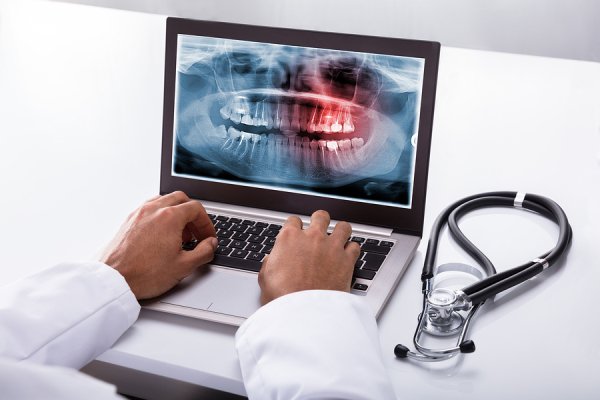
Dentists need to examine X-rays periodically, both for screening and for diagnostic purposes. This is because X-rays allow dentists to find hidden problems that a visual exam can miss, such as cavities, an abscess, etc. They also allow for the analysis of malocclusion. And if you’re having a procedure, X-rays support the treatment planning process. Look for a general dentistry office that features digital X-ray equipment.
What makes digital X-rays different?
Conventional X-rays must be developed from film, and the quality is poor compared to digital X-rays. When your dentist takes a digital X-ray, the image is immediately sent to the computer software. Since the image is digital, your dentist can manipulate it to enhance clarity. This allows for more accurate diagnoses and more precise treatment planning. With digital X-rays, the dentist is able to explain what they are seeing in a more accurate and understandable way. It also decreases the amount of time you’ll spend in the chair, since there’s no development time required.
Do digital X-rays use more radiation?
No. Actually, digital X-rays use a great deal less radiation than conventional X-rays. You’ll get about 70% to 80% less radiation with this advanced technology. It’s also possible that digital X-rays can decrease the total number of X-rays you’ll need. Since the images are stored digitally, you can have X-rays taken elsewhere sent immediately to another office.
Besides cavities, what can digital X-rays detect?
Cavities are just one of many dental issues that can be diagnosed with the help of digital dental X-rays. Your dentist can analyze the images for signs of cysts, tumors, and periodontal disease. They can reveal bone loss, tooth positioning problems, and wisdom teeth eruption. X-rays can also be used to evaluate potential defects in dental restorations.
How often do I need X-rays?
This depends on your own personal dental health history. Some patients need them every six months. Others may only need them once every year or two years. It’s also customary for dentists to take X-rays of new patients, so that changes over time can be evaluated.
University Associates in Dentistry invests in the latest dental technologies, including digital X-rays, to promote the health and safety of our patients. Our protective X-ray aprons extend over the thyroid gland for maximum safety. When you’re ready for general or cosmetic dentistry in Chicago, call our friendly office staff at (312) 704-5511.



